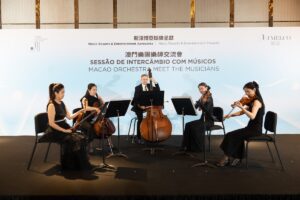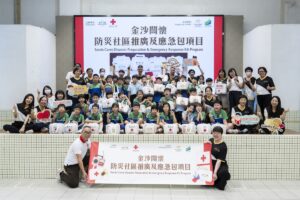Macau is seeing greater opportunities for vocational training for emerging talent as it looks to action its “1+4” diversified development policy.
After experiencing the impact of the COVID-19 pandemic for three years, Macau’s society is acutely aware of the need for more diversified development. This not only includes the diversification of industries but also the diversification of professional skills.

So, what policies and measures have the Macau SAR government and enterprises implemented in regard to the all-round development of professional skills, continuous learning and the integration of cross-domains? And what opportunities for the development of diverse skills in the workplace will this bring to Macau in the future?
Demand in Macau’s labor market has undergone notable change in recent years. This stems from the SAR government’s implementation of the “1+4” diversified development policy, where the government expects that the GDP share of industries outside Macau’s traditional entertainment sector will increase to 60% and the equivalent proportion of employment in such sectors will increase to 80% by 2028.
This change in the labor market has led to an increase in demand for vocational skills training. People are pursuing vocational training courses in a wide range of diversified fields. According to data from the Survey on Vocational Training, the number of people engaged in Art & Design courses reached 5,886 in 2023, an increase of 93% compared to the pre-pandemic period in 2019. This is an indication that as Macau’s industrial structure is adjusted, the demand for creative and design talents has significantly grown. Meanwhile, participants in health courses reached 9,570 in 2023, an increase of 187% compared to 2019, which is in line with the SAR government’s “One Health” policy.
These data points reflect that the demand for vocational skills training in Macau society is also undergoing significant changes, shifting to focusing on diversified development in different industries. The skills requirements for talent are also being adjusted accordingly.
Vocational training
In 1992, the former Labour and Employment Bureau (now the Labour Affairs Bureau) took over the Vocational Training Centre from the Education and Youth Affairs Bureau (now the Education and Youth Development Bureau). Since then, the formats, systems and offerings of vocational training courses have continuously evolved and innovated, becoming an opportunity for the workforce to acquire diverse skills.
According to information from the Statistic and Census Service (DSEC), a total of 1,915 courses were offered through Macau’s vocational training programs in 2023, representing a year-on-year increase of 17.8%, while the attendance reached 97,672, representing a year-on-year increase of 25.1% and up by 15,746 compared to 2019.

“Talent cultivation is a long process which requires meticulous planning by the government,” said Macau Legislator Leong Hong Sai. He added that vocational training courses introduced by the government in recent years precisely match the direction of its “1+4” diversified development, such as the ‘“Basic Course on Performance and Conference Sound”, “E-commerce Live Streaming” and “Product Short Video Marketing Personnel”.
“In the planning of diversified vocational training, the government should work together with the industry and educational institutions to continuously launch more diverse and enriching courses in response to social needs, in order to support Macau’s economic diversification policy.”
Vocational training lays down the foundation for obtaining professional qualifications, which provide personal career development for citizens. Through vocational training courses, DSAL has introduced various skill certifications over the years, including those for electricians, real estate brokers and employment service counselors.
In 2011, DSAL introduced the “One Test, Two Certificates” and “One Test, Three Certificates” tests, which allowed citizens to obtain both national and Macau vocational qualification certificates by passing a single test, providing favorable conditions for local citizens to work or start businesses in mainland China.

Professional matching and industry alignment
Regarding vocational training, Leong believes that the training programs need to keep up with social development and provide appropriate professional matching. Using the expansion of the Macau International Airport as an example, “It is expected that the airport will need more frontline and back-office staff in the future and these staff should come equipped with certain professional skills. However, the existing training programs seem unable to meet the needs of future development.”
He suggests that the industry can learn from the “General Land Surveying Course” – offered by the Macau Survey and Cadastre School – which has seen almost 300 graduates across 13 years. The course allows citizens to have the professional capability and entry requirements for future surveying-related work.

“It is recommended that the government should link up with the industry and educational institutions to offer more relevant professionally-matched courses, in order to effectively meet the demand for Human Resources,” Leong added.
Macau’s leading industry is gradually transforming to the direction of “1+4” diversification, causing enterprises to require employees to equip themselves with different professional skills. Therefore, educational and training institutions closely cooperate with enterprises to design comprehensive development courses that meet market demand. However, the rapid development of emerging industries may inevitably lead to a mismatch between the supply and demand of talent.

Workplace mentor in the Greater Bay Area and CPPCC member of Guangzhou Baiyun District, Ho Man-yi, believes that the SAR diversified development policy has indeed brought new opportunities to the market.
“In the past 20 years, Macau’s industry chain has mainly relied on the [entertainment] industry,” Ho said. “When four new industries are introduced now, the demand for vocational skills has also increased accordingly.

“But the transition of talent between the old and new industries requires a sound talent cultivation and matching mechanism. From a market perspective, vocational training needs to have professional matching, otherwise there will be a problem of resource mismatch.
“Regarding the four major industries proposed by the SAR government, the market should pay attention to whether there are suitable matching job types.

“For example, professional courses matching the convention and exhibition industry already exist, but more professional match training is needed for the other three industries (One Health, high-tech and modern finance) to provide greater momentum for vocational training.”
She also pointed out that the market needs to have a certain capacity to give citizens enough space to change their career fields. Ho suggests that the market strengthen policy support for emerging industries, create better conditions for their talent development, and formulate clearer policies for industry regulations so that industrial development and career transformation can be better connected.

Government and corporate measures
To realize the all-round professional development of Macau citizens, systematic support from the government, enterprises, educational institutions and other sectors is needed. Through comprehensive and thorough cultivation and safeguarding, Macau citizens can have ample opportunities for development and maximize the realization of their self-worth.

In recent years, Macau’s Labour Affairs Bureau has frequently organized courses focused on vocational training and career transformation, including many collaborative projects with large enterprises. One of the popular programs is the “Employment + Training Special Program” launched in 2023.
The program is a collaboration between the government and larger corporations, encouraging citizens to “get employed first, then receive training”.
Through these systematic training programs, the initiative helps employees master different fields within their industries and corporations, thereby enhancing their professional skills and facilitating smooth integration into diverse sectors.

Since its launch in 2023, the program has introduced 19 training projects and employed 379 people.
Furthermore, some large enterprises have set comprehensive professional development as their strategic goal and have launched several initiatives over the years. These include vertical and horizontal training models, providing resources for local employees to have cross-professional development opportunities, and even offering diversified training for employees working for large-scale Macau resort companies. These positions cover sectors of security, property management, entertainment and catering, which expands employees’ career development prospects.

Future direction
Overall, in terms of vocational training policies in Macau, the cooperation between the government and enterprises has become closer post-pandemic. This collaboration drives large enterprises to improve training and promotion systems for local employees and jointly organize participation in global and regional vocational skills competitions. Additionally, it strengthens cooperation and exchange with vocational training institutions worldwide, thereby enhancing the skill levels of local residents.

The SAR government is also strengthening cooperation with the nine mainland cities in the Greater Bay Area. In line with the recommendations in the “Second Five-Year Plan for the Economic and Social Development of the Macao Special Administrative Region (2021-2025)”, the government is promoting the mutual recognition of vocational qualifications, supporting Macau residents’ employment in the Greater Bay Area, and expanding more diverse and higher-level certification courses and skills tests based on existing programs in alignment with mainland policies.
Corporate cooperation and integration into the Greater Bay Area are indispensable for comprehensive professional development. As a continuous process, all-round professional development requires the concerted efforts of the government, enterprises and educational institutions to form a systematic support structure in terms of education, employment, management and safeguards, so that every Macau resident can have ample opportunities for development, driving the overall progress of Macau society.
































